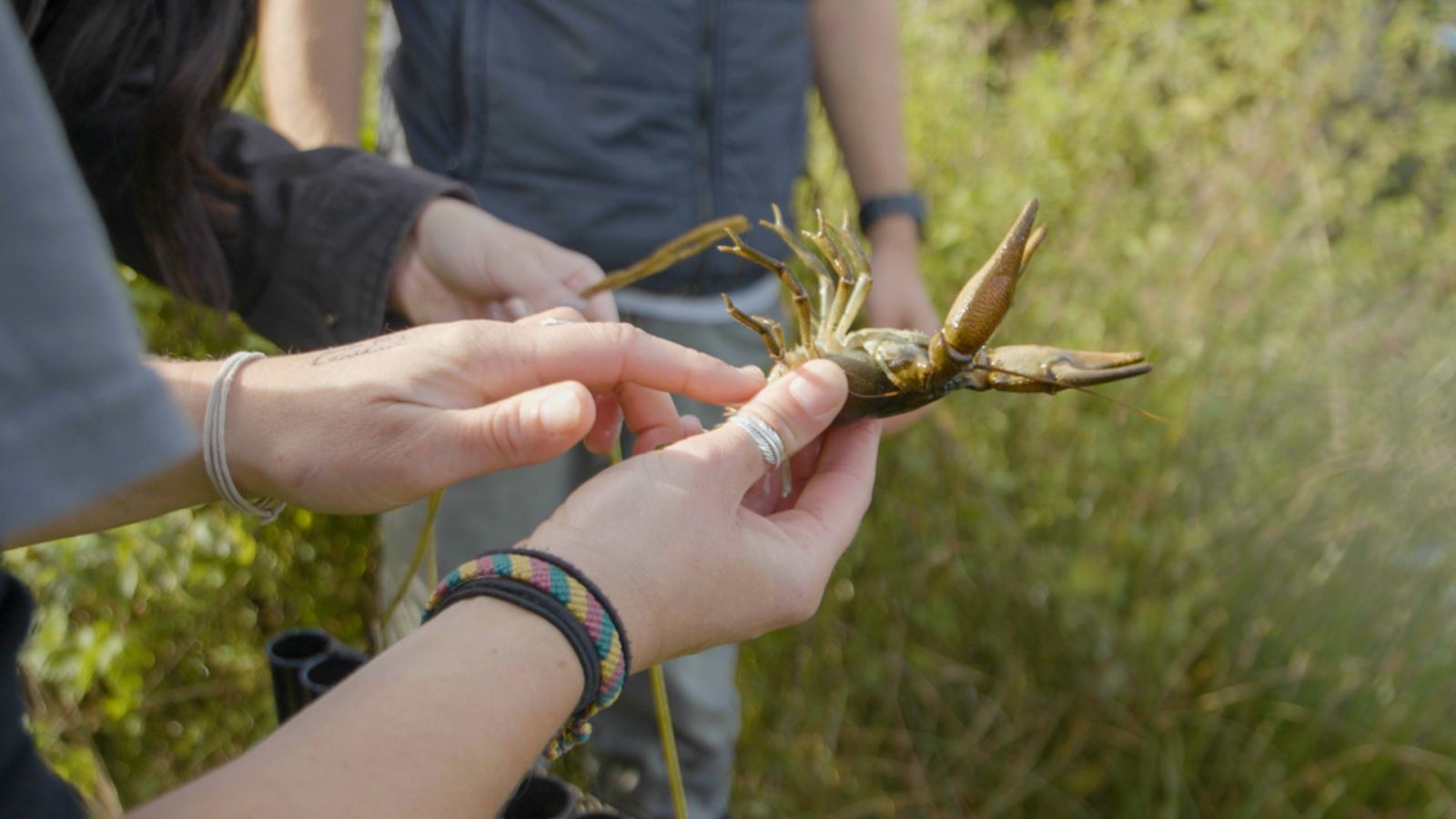Endangered crayfish bred by conservationists from Bristol Zoological Society have been released into a safe site in Somerset to help safeguard the future of the species.

Altogether 64 of the tiny white-clawed creatures were introduced into a brook in the Mendip Hills in the past weeks bringing the total over the past year to 142.
This species is the only native freshwater crayfish in the United Kingdom but is at risk from non-native, invasive crayfish such as the American signal crayfish. The signal crayfish not only out-competes the white-clawed crayfish, but carries a fungal disease, called crayfish plague, which is deadly to our native species.
Invasive signal crayfish species also have serious economic implications, by increasing the chance of flooding, and decimating invertebrate and fish populations within our rivers.
As a result the native white-clawed crayfish are listed as Endangered on the International Union for the Conservation of Nature’s Red List.
Dr Jen Nightingale, UK Conservation Manager with Bristol Zoological Society, began working to save white-clawed crayfish in 2006 and two years later launched the South West Crayfish Partnership.
She said: “We are building up populations using captive-born crayfish in the hope that we will prevent them becoming extinct.
“Numbers are in decline and, without projects like this, white-clawed crayfish could disappear from south west England in the next 10 years.”
The white-clawed crayfish, bred by Bristol Zoological Society, are released into ark sites, which are safe areas of water that are free from signal crayfish predators.
The South West Crayfish Partnership has released captive-born white-clawed crayfish into such sites in Somerset and Devon in the past few weeks ready for the start of the breeding season.
Dr Nightingale said: “We know they can live at least six years and may well live longer and they can have several breeding cycles.”
She said that during the latest release she discovered one of the crayfish from last year still thriving.
“That was a special moment for us and proof that what we are doing is making a difference,” she said.
Bristol Zoological Society’s crayfish hatcheries are the only ones in England from where thousands of white-clawed crayfish have been taken to ark sites and sent to organisations all over the country.
Dr Nightingale said: “Signal crayfish are so pervasive and controlling them is a long-term, challenging process but ark sites give our native crayfish a safe environment.
“We set up 20 of these sites and as of this year, we know from our surveys that 13 are thriving with established crayfish populations. Crayfish don’t always take to the ark sites for a variety of reasons, so that is why currently seven ark sites aren’t considered thriving but we continue to monitor them.
“Adding to the 15 remaining natural populations, our 13 successful ark sites are bolstering this important native species”.
Dr Nightingale said research was taking place across Europe on invasive crayfish control methods, including investigations into curbing the reproduction of signal crayfish, to help ensure the survival of the white-clawed crayfish and other native European crayfish species.
She said: “We are continuing to breed white-clawed crayfish ready for release next year. They are an important part of the aquatic ecosystem and of the food chain.”
Bristol Zoological Society has been a permanent member of the South West Crayfish Partnership. Other organisations in the South West Crayfish Partnership are the Environment Agency, the Centre for Fisheries, Agriculture and Science, Hampshire and Isle of Wight Wildlife Trust, Bristol Water, South West Water, the charity Wild Planet Trust and, Nicky Green Associates.
Bristol Zoological Society is a conservation and education charity and runs Bristol Zoo Gardens and Wild Place Project. It relies on the generous support of the public not only to fund its important work at both zoos, but also its vital education and community outreach programme.
In March last year the Society launched the BZS Appeal to ensure the future of its work ‘saving wildlife together’ following the temporary closure of both its sites in the face of the COVID-19 pandemic.
As school groups can now be welcomed back to both zoos, donations from the appeal fund will support the Education Bursary Fund, to ensure schools and youth groups in disadvantaged areas are able to benefit from visiting Bristol Zoo Gardens and Wild Place Project.
To find out more, or to make a donation, visit https://bristolzoo.org.uk/bzsappeal
Related
Comments
Nobody has commented on this post yet, why not send us your thoughts and be the first?













